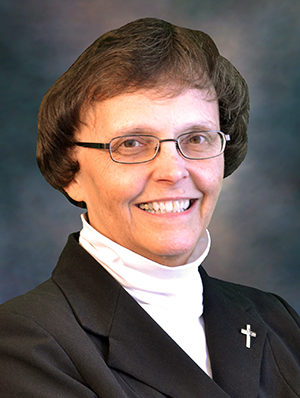
Eucharist draws us to just action
Sister Joyce Lehman • President, Sisters of the Precious Blood
The inspiration passed down to us from our foundress, Maria Anna Brunner, came from her time spent before the Eucharist in adoration and prayer. Her words and actions illustrated a life deeply rooted in the redeeming love of Jesus. That love made her acutely aware of the needs of those around her and urged her to meet those needs. Her life was contemplation in action and her care for those around her was food for reflection during her hours of adoration. She instinctively knew that one aspect of her spiritual life without the other would not have been fruitful.
As daughters of our foundress we recognize the call to imitate her. We live life in an effort to nourish its contemplative and active aspects. This issue of Sharing and Caring will illustrate many of the ways our Sisters are engaged in an active life of meeting the unmet needs of those we encounter. In this engagement we hold the words of the Trappist monk Thomas Merton close in mind and heart: to allow oneself to be carried away by a multitude of conflicting concerns, to surrender oneself to too many demands, to commit oneself to too many projects, to want to help everyone in everything, is to succumb to violence. More than that, it is cooperation in violence. It destroys one’s own inner capacity for peace. It destroys the fruitfulness of one’s own work because it kills the root of inner wisdom that makes the work fruitful. Thomas Merton was a monk in the contemplative tradition, but an activist when it came to being aware of the poverty, oppression, exclusion and senseless violence in the world beyond the monastery gates. And when he found himself so engaged in the desire to solve the world’s problems, he knew he needed to return to his truest self and, in silence and contemplation, bring the world to the only One who can make the final difference.
In our contemplation and adoration, whether in church, chapel or our own rooms, we often pray before a crucifix: the sign that death was conquered and that new life beyond death is promised to all. We contemplate this symbol of violence as a way to remind ourselves that Christ came to conquer death. These early months of a new year include the liturgical season of Lent and Easter and we immerse ourselves in the mysteries they present to us. Out of this immersive contemplation, we look with new eyes and see where we have yet to bring the redeeming love of Jesus to the world around us: in family, neighborhood or workplace; in our parishes, associations and service organizations; and in our leisure activities. Wherever people are, the love of God can be proclaimed. Wherever love is not, the God who is Love, the God whom we come to know and love in contemplation, desires to be brought by us in word and action, silence and waiting.
As you read the following stories keep in mind where, or perhaps more accurately Who, this action for peace, for justice, for the protection of creation arises from and goes to.





